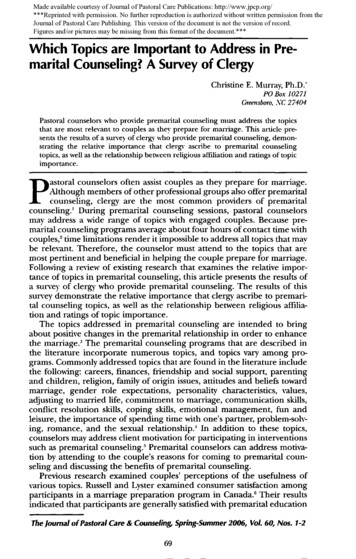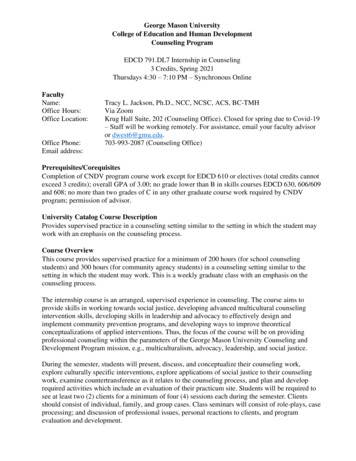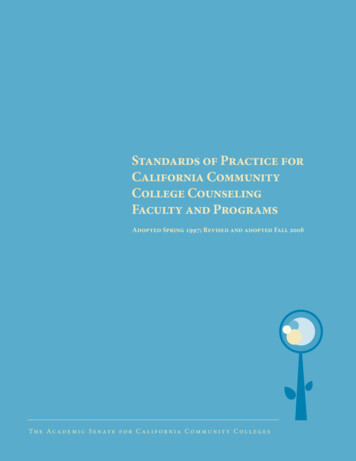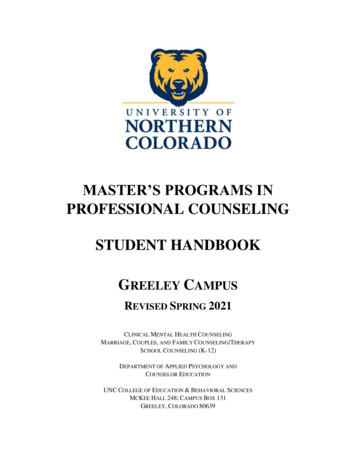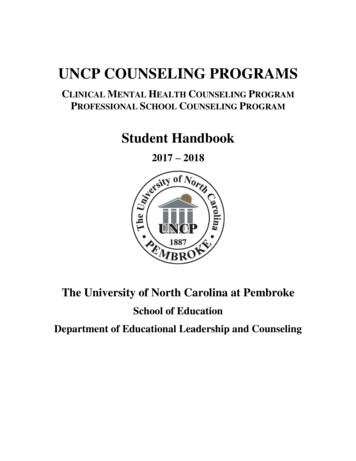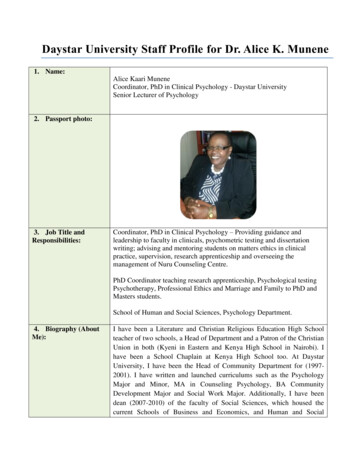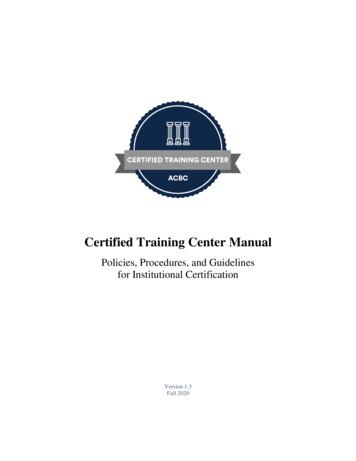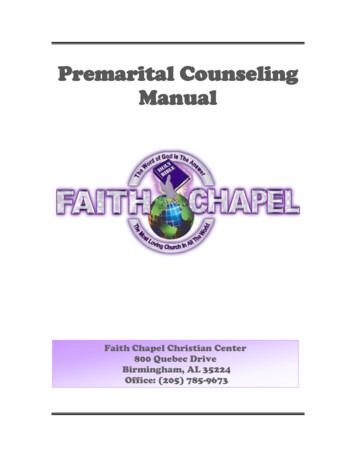
Transcription
Premarital CounselingManualFaith Chapel Christian Center800 Quebec DriveBirmingham, AL 35224Office: (205) 785-9673
Premarital Counseling ManualTable of ContentsSession 1 Expectations and General InformationReasons for MarriageSession 2 Uniqueness & Acceptance in Marriage—Part ILove is a Basis for Marriage—Part IISession 3 Marital ExpectationsMarriage Anticipation QuestionsSession 4 Roles, Responsibilities, and Decision MakingIn-LawsSession 5 CommunicationResolving ConflictSession 6 FinancesSession 7 Divorce and RemarriagePremarital Counseling Manual – revised 04/06-2-
Pastoral Care Premarital Counseling SessionsPremarital ClassesFirst SessionExpectations and General InformationReasons for Marriage Introduce yourself and purpose of sessionsDetermine Number of Sessions Needed Materials Required1. Laws of Marriage—tape series2. Roles/Responsibility of Husbandand Wife—tape series3. Five Love Languages by GaryChapman—book4. His Needs Her Needs— by WillardE. Harley book If the couple has kids coming into themarriage1. Who’s the Boss—The BlendedFamily (tapes)2. Trouble in the House—UnequallyYoked (tapes) Finances1. For one month, write downeverything you spend.2. Do a budget. The budgets are tosee where you stand financially. Second SessionThird SessionThe sessions are encouraged to be 3-4weeks apart. Begin Session OneUniqueness and Acceptance Do the Outline At the end of the second session1. Provide couple with homeworkassignment2. Encourage couple to bring backhandout (Marriage AnticipationQuestions)3. On the back, make a list of thingsyou would expect from yourspouse.Expectations Follow Outline Go over homework assignment Provide feedback based on informationprovided Encourage them to listen to the Roles,Responsibility, and Decision-making tape.Premarital Counseling Manual – revised 04/06-3-
Pastoral Care Premarital Counseling SessionsFourth SessionFifth SessionSixth SessionSeventh SessionPremarital ClassesRoles, Responsibility, and Decision Making Do the outline and Roles and Responsibilityworksheet1. Indicate to the couple that they areDYING TO SELF2. Emphasize him loving his wife andtaking care of the family—TheProvider3. Emphasize to her and explain truesubmission/they are workingtogether.Communication Do the outlineFinances Follow outline Provide feedback based on informationprovided. If this is the last session, reveal to thecouple potential challenges (if youobserved any.) Encourage them to get these tapes:1. Problems in Marriage2. Meeting Sexual Needs—Wife/HusbandDivorce and Re-Marriage Follow provided outline Discuss the blended family tape.Note: Maybe times you will need to talk to the couple individually.Premarital Counseling Manual – revised 04/06-4-
Premarital Counseling FormProspective GroomName:Home Phone:Work Phone:Cell Phone:Member: Yes NoIf yes, How Long? Years MonthsIf no, where’s membership?Married before? Yes NoHow many times?How long have you been divorced?How many children do you have?Number of male Number of femaleAges:How long have you known each other?Years MonthsHave you set a weddingdate? Yes NoProspective BrideName:Home Phone:Work Phone:Cell Phone:Member: Yes NoIf yes, How Long? Years MonthsIf no, where’s membership?Married before? Yes NoHow many times?How long have you been divorced?How many children do you have?Number of male Number of femaleAges:How long have you been dating?Years MonthsIf yes, when?Sessions CompletedReasons for MarriageUniqueness and Acceptance in MarriageWhat Do You Expect from Marriage?Roles/Responsibilities and Decision MakingCommunicationFinancesDivorce and RemarriageDateDate CompletedComments/Notes/Additional Sessions RecommendedCommentPremarital Counseling Manual – revised 04/06-5-
Signature of Counseling Minister DateSession One – Reasons for MarriageIntroductionThere are many reasons for marriage and motivating factors for marriage. The purposeof this session is to explore some of the possible reasons and motivations.Exercise—On a separate sheet of paper, list three reasons why you are marrying yourfiancé. After you have done that, list the three reasons why you think your fiancé ismarrying you. Then share the results.I. Unhealthy Reasons for Marriage1. Loneliness—fear of being a bachelor or an “old maid.”2. Marrying on the Rebound—You were hurt in a former loverelationship and to ease the hurt, you immediately choose another.3. Your fiancée is pregnant.4. You have had sex.5. To spite or get back at your parents6. Appearance7. EconomicsQuestion: Are any of these things a reason for your decision?II. Positive Reasons for Marriage1. Companionship2. Love3. Because you are convinced that it is God’s will for you to marry this person4. To fulfill sexual needs in the way God intendsPersonal Notes The couple must listen to the audiotape “God’s Viewpoint on Marriage” beforethe first session. Ask if they have any questions regarding the tape.Premarital Counseling Manual – revised 04/06-6-
Session Two-Part 1 – Uniqueness & Acceptance in MarriageOpening StatementYour partner is not you! He or she is other, created in God’s image—not yours. He orshe has a right to be other, to be treated or respected as other.Introduction—If you plan to marry, it is certain that you have a pre-conceived fantasy ofyour ideal mate or the perfect marriage. After a while, you will begin to realize that yourfantasy and the person you have married will begin to diverge sharply. At that point, youmay embark upon a reform program, forgetting that only God can make a tree. Youmisconstrued the words of the wedding ceremony “and the two shall become one” tomean that your mate should become like you and your fantasy. The oneness in marriageis not similarity or sameness in matters relating to ideas or feelings, but to the oneness ofunderstanding.ExerciseHandout #1Instructions: Have each one complete this separately then discuss. Have copies made inadvance. Give them five (5) minutes to complete.ConclusionIt is important to remember that one of the main motivating factors toward marriage isthe person’s need to feel complete because of what the other person has to offer.Consciously or unconsciously, people choose others who help them feel complete.Premarital Counseling Manual – revised 04/06-7-
MARRIAGE MANUALSession #2HandoutSIMILARITIESUniqueness and Acceptance in MarriageDIFFERENCESHow are my fiancé and I similar?How are my fiancé and Idifferent?Premarital Counseling Manual – revised 04/06-8-EFFECTHow can these differences orsimilarities complement oneanother in our marriage?
Session Two—Part 2–Love is a Basis for MarriageOpeningMost couples say they are marrying because they love their fiancé. Let’s assume that inthis society, in order to obtain a license, you had to convince a jury that you really lovethe other person.Exercise: Write three (3) facts you would present to prove your case. Include in this yourdefinition of love.Instructions: Promote dialogue and discussion during this exercise.What is Love?1. Love is a feeling you feel when you get a feeling you’ve never felt before.2. To love somebody is not just a strong feeling—it is a decision. It is a judgement. It is a promise.3. Love is an unconditional commitment to an imperfect person.Marriage Needs Three Types of Love1. Eros—seeks sensual expression—romantic; sexual2. Philia—friendship which includes companionship, communication, andcooperation.3. Agape—unconditional, self-giving, forgivingNote Agape love is not just something that happens; it is something you make happen. Agape love is kind, sympathetic, thoughtful, and sensitive to the needs of theother.Both of you must make a quality decision to embrace all three of these in order tohave a good, happy marriage.ExerciseHandout #2—When you are married, what can you do to demonstrate these three kinds oflove? Write at least three examples under each category.Note: Have the couple do this independently. Go over it and discuss.Conclusion Your love will either live or die. What kills love?1. A failure to spend time alone together doing things you both enjoy.2. A failure to reinforce appropriate behavior in each other. For example: smiling,complementing, spending time together alone, showing compassion.Question: What do you do now to reinforce the appropriate behavior in each other?Note: Assignment for next session 1) Complete list of expectations 2) Complete Marriage AnticipationquestionsPremarital Counseling Manual – revised 04/06-9-
MARRIAGE MANUALSession #2Handout #2THREE KINDS OF LOVEEROSPHILIAAGAPERomantic, SexualFriendship (includescompanionship, communication,cooperation)Self-giving, unconditional,forgivingPremarital Counseling Manual – revised 04/06- 10 -
Session Three–Marital ExpectationsWhat do you expect from marriage?Every person who marries enters the marriage relationship with certain expectations.These expectations come from many sources such as parents, values, society, books,speakers, our own ideas, etc. For example, a husband might expect his wife to be at thedoor when he arrives home, to always be at home and never work, and to have sex withhim whenever he wants to. A wife might expect her husband to go to her parent’s housewith her whenever she goes, to be the spiritual leader in their home, and to spendSaturdays at home and not hang out with the guys.ExerciseHandout 1—Marital ExpectationsHandout 1A—Complete Marriage Anticipation questionsGoals in MarriageLess than three percent (3%) of married couples have set goals for their marriage. Goalsare vital, for unless you have something in mind that you want to work toward or achieve,you will not get very far. “Where there is no vision (goal), the people perish .”Proverbs 29:18.ExerciseHandout 2—Goals in MarriageFulfilling Needs in MarriageOne of the motivating factors for marriage is the fulfillment of needs in one’s life. Inmarriage counseling, we find that one of the major complaints couples bring in is that ofnot having their needs met. Often, one partner is attempting to meet the needs of theother but he does not always know what the needs are and/or does not know exactly howto meet them. Thus, it is important for a married person to define his needs specificallyand then indicate how he would like his partner to respond in order to meet these needs.Exercise (Written or Oral)Note: If exercise is completed orally, the couple should turn to each other andcommunicate.Needs in Marriage1. Physical2. Emotional3. Social and Intellectual4. SpiritualWhat My Spouse Can Do to Fulfill These NeedsPremarital Counseling Manual – revised 04/06- 11 -
MARRIAGE MANUALSession #3Handout #1MARRIAGE EXPECTATIONSList four expectations you will have of your fiancé when you are married.1.2.3.4.Now list four expectations you think your fiancé will have for you in marriage.1.2.3.4.*Exchange your list of expectations and discuss. *Premarital Counseling Manual – revised 04/06- 12 -
MARRIAGE MANUALSession #3Handout #1-AMARRIAGE ANTICIPATION QUESTIONS1. What I appreciate most about my fiancé is.2. What I dislike the most about my fiancé’ is.3. Once we are married, the biggest change I will have to make is.4. When I think about our marriage, what concerns me the most is.5. What makes me the angriest is.6. When I get married, the biggest change I will experience with my own familyis.7. Of all the members of my family, I would say that the family member myfiancé is closest to is.8. Of all the members of my family that my fiancé knows, I would say that thefamily member he or she is least close to is .9. I would say that the hardest subject for the two of us to talk about is.10. I think the greatest strength of our relationship is.Premarital Counseling Manual – revised 04/06- 13 -
MARRIAGE MANUALSession #3Handout #2GOALS IN MARRIAGEList four goals for your marriage (you both want to achieve.)(Time limit, if possible)1.2.3.4.List two goals that you would like to see your fiancé achieve.1.2.List two goals that you yourself would like to achieve.1.2.WHAT ABOUT ?a. Where are you going to live?b. What about work will you both work for how long?c. What about churches will you both attend the same church?d. What about children how many.when birth control?e. What about school do you have any plans of furthering your education?Premarital Counseling Manual – revised 04/06- 14 -
Session Four–Roles, Responsibilities, and Decision MakingPersonal Note The couple and the Pastor must listen to the audiotape “Roles, Responsibilities,and Decision making” prior to this session.Ask if there are any questions concerning the tape.Handout #1Handout #2Role Concepts ComparisonDecision Making ProcessIn-LawsBy reason of your new marriage, you will become an in-law and you also gain in-laws.The questions below are designed to assist you in your effort to establish a wholesomerelationship with your future in-laws.First, discuss their present parental relationships.1. Are both parents alive?2. How was your childhood relationship with your parents? (Example: Did theyraise you?)3. How is your present relationship with your parents?4. How do your parents feel about your plans for marriage?5. How do you think your in-laws view you?6. What would you consider to be interference by your in-laws?7. Describe how and where you would like to spend your first Thanksgiving &Christmas.8. What does leaving mother/ father mean to you? What do you think it involves?Premarital Counseling Manual – revised 04/06- 15 -
MARRIAGE MANUALSession #4Handout #1YOUR ROLE CONCEPTS COMPARISONThe purpose of this session is to assist you concerning your expectationsregarding the husband-wife roles in your relationship.What do you believe about your role concept in marriage? For each statement below,circle one number.(1)(2)(3)(4)(5)Wife3 4Strongly agreeMildly agreeNot sureMildly disagreeStrongly disagree1Husband2 3 4 5B. The wife should not be employedoutside the home.123455C. The husband should help regularlywith the dishes.1234545D. It is alright for the wife to initiatelovemaking with her husband.12345345E. The husband and wife should plan thebudget and manage the money matterstogether.123452345F. Neither the husband nor the wifeshould purchase any major itemswithout consulting the other.1234512345G. The father is the one responsible fordisciplining the children.1234512345H. A wife who has special talent shouldhave a career.12345125123451234123121DescriptionA. The husband is head of the home.YOUR ROLE CONCEPTS COMPARISONPremarital Counseling Manual – revised 04/06- 16 -
Wife3 41Husband2 3 4 5J. The husband should take his wife outsomewhere twice a month.123455K. The wife is just as responsible for thechildren’s discipline as the husband.1234545L. It is the husband’s job to do the yardwork.12345345M. The mother should be the teacher ofvalues to the children.123452345N. Children should be allowed to helpplan family activities.1234512345O. Children develop better in a homewith parents who are strictdisciplinarians.1234512345P. Money that the wife earns is hermoney.1234512345Q. The husband should have at least onenight a month out with his friends.1234512345R. The wife should always be the one tocook.1234512345S. The husband’s responsibility is to hisjob and the wife’s responsibility is to thehome and children.12345125123451234123121DescriptionI. It is the wife’s responsibility to keepthe house neat and clean.Premarital Counseling Manual – revised 04/06- 17 -
MARRIAGE MANUALSession #4Handout #2YOUR PERCENTAGE OF THE DECISIONDescribe the decision-making process that you think you will have in your marriage byputting the percentage of influence that you will have and that your spouse will have forvarious issues. The total for each decision must be 100 percent.DescriptionHer Vote (%)Choice of a new carChoice of a homeChoice of furnitureChoice of your own wardrobeChoice of vacation spotsChoice of décor for the homeChoice of mutual friendsChoice of entertainmentChoice of churchChoice of child-rearing practicesChoice of TV showsChoice of home menuChoice of number of childrenChoice of where we liveChoice of husband’s vocationChoice of wife’s vocationChoice of determining for what and how the moneyis spent.Premarital Counseling Manual – revised 04/06- 18 -His Vote (%)
Session Five–Communication(Oral Exercises)Communication is to love what blood is to life. It is impossible to have any kind ofrelationship unless there is communication. That is true for you and your fiancéand for your relationship with God.How would you define communication?A. Communication Three basic elements1. Talking2. Listening3. UnderstandingTalking In our communication we send messages (talking). Every message has threecomponents: the actual content (words), the tone of voice, and nonverbal communication(gestures—smile, gentle touch, tears, raised eyebrows, rolling eyes, grunt, turned head,etc.) One researcher has suggested that most of our messages are sent through tone ofvoice and nonverbal communication.Content 7% vs. 77%Tone of Voice 38%Nonverbal Communication 55%a. Exercises1. You are trying to watch your favorite TV program, but your spouse iscontinually interrupting and asking you questions. The program is at acrucial part and you don’t want to miss it. You say .2. Your spouse serves you breakfast. You notice that the bacon isovercooked, which you don’t like. The toast is served lightly toasted withfresh butter, which is exactly what you like. You say .b. Things to Avoid1. Sarcasm Sharp remarks designed to cut or give pain.2. Ridicule to make fun of (overweight, etc.)3. Innuendos Negative insinuations, hints, or concealed putdowns.Note: We are not talking about good-natured humor –but that which destroys the selfesteem of your spouse (rudeness).“Wherefore, my beloved brethren, let every man be swift to hear, slow to speak,slow to wrath”. –James 1:19Premarital Counseling Manual – revised 04/06- 19 -
c. Listening defined (James 1:19; Proverbs 17:28)1. Shut your mouth2. Lay aside your point; hear with thoughtful attention3. Create a non-threatening environment; watch negative gestures thatsuggest, “You are stupid.” “I don’t want to hear you.”4. Repeat what was said. (You should be able to if you were listening.)5. Ask questions for clarity.d. Understanding What is Understanding? (Proverbs 18:2 Amplified Bible)1. Consider what your spouse is saying.2. Empathize; Put yourself in your spouse’s place; Seek to understandyour spouse’s feelings as well as the words spoken.B. Discuss the Enemies of Communication1. Tears2. Criticism3. Talkativenessa. Talking too much.b. Failing to keep family confidence.4. Silence—“turtle act”5. Sensitiveness—easily hurt or offended6. Pride—at times you have to admit you were wrong7. Selfishness—“I just don’t feel like talking.”8. Anger9. Unforgiveness10. Introverted—quiet, shy personality (Marriage is a team sport.)C. Resolving ConflictConflict is inevitable. When two imperfect people with different personalities, attitudes,backgrounds, and sometimes-different needs, desires, and goals come together, conflict,contention, and disagreement is inevitable. The conflicts themselves are not the problembut rather the couple’s reaction to them. Good communication is the key to solving anykind of problem.1. Five ways to deal with conflict.a.Withdraw—physically or psychologically—the situation orproblem viewed as hopeless; consequently, there is no need to tryto resolve the conflict.b.c.Win—the proud and domineering person has determined to win,proven to be right no matter what the cost, even if it meansdestroying the other person or the relationship. (This marriageusually ends in divorce.)Yield—give in to get along. You don’t like it, but rather thanfight, you give in to the other person’s wishes. (The person usuallyends up hurt, frustrated, and resentful.)Premarital Counseling Manual – revised 04/06- 20 -
d.Compromise—give a little to get a little.e.Resolve—through open and direct communication, coming to apositive where you can both function and be satisfied.2. Principles to Resolving Conflicta.When conflict arises, instead of demanding that you be heard,listen carefully to the other person. (Proverbs 18:13)b.Select an appropriate time. (Proverbs 15:23 AMP)c.Each person should define the problem and the areas of agreementand disagreement. (Note: You may be talking about differentthings. Following this procedure will also keep you from repeatingthe same things over and over.)d.Since most conflicts are two-sided, honestly and objectivelyidentify your own contribution to the problem.Note: If your spouse sees you are willing to accept some responsibility, he(she) will probably be more open and cooperative.e.State what you (both spouses) can do to help and ask yourspouse’s opinion. (Be open and guard againstdefensiveness.)f.PrayPremarital Counseling Manual – revised 04/06- 21 -
Session Six–FinancePart I—IntroductionMoney! It takes money to eat, pay the rent, buy groceries, etc. Your attitude towardmoney and your past lifestyle may be an adjustment for you as you enter into marriage.The exercises in this session have been designed to help you determine what is importantto you in terms of finances and to help you make realistic plans for your future.Exercise #1Purpose—To reveal just how much or how little you know about the cost of itemspurchased by your fiancé.Instructions—Have each person take a few minutes to complete the handout separately.Use price ranges rather than exact dollars. Then go over one for the women, and then themen, having them critique each other. You merely serve as a mediator. (However, itwould be wise for you to know what items cost).(Note: Why is this important to know? What was this designed to do?)(Scripture Reference: Song of Solomon 2:15)Part II—Principles to Live By—Handout #2Instructions—Have couple read one scripture at a time, and then answer the question. Itmay be a good idea to assign a scripture if one person appears to be more vocal. Youwant total involvement.If time is limited, you should use only a few during the session and ask them to finishlater.Note: At this point, you can go over the following seven principles used in the Pastor’smost recent seminar.1. Tithes and Offering—laws of prosperity2. No longer two but one—no division3. Budget and plan for big expenses—taxes, insurance, vacations, nonreoccurring expenses.4. Patience5. Can have joy/peace—even when you are standing in faith—don’tallow Satan to divide you over financial situations—key: rightpriorities. (Marriage comes first.)6. Work together—Open communication7. Have a marriage enrichment fund—Set aside money for the purpose ofPremarital Counseling Manual – revised 04/06- 22 -
enhancing your marriage. (Example: eating out, honeymoon weekend,movies, books/tapes, retreat, and some activities together.)Handout #2—What Principles Do You Derive from These Verses?Part IIIHandout #3—Principles of Handling Money(Source: Edwin Cole—Communication, Sex, and Money)Instructions: Go over each principle (or a limited number of principles) and discuss. Askquestions and clarify as needed.Part IVPlan and Prepare a Workable BudgetNote: Determine if couple already has a budget.Instructions: 1) Go over the Do’s and Don’ts for Budgeting from Handout #4.2) Encourage couple to prepare a budget as soon as possible, preferablybefore the wedding.Note: If this is the last session, recommend couple listen to the recent tapes on “Sex”done by the Pastor in the Marriage seminar. Problems in MarriageSexual ProblemsMeeting Your Spouse’s Sexual Needs—Wives/HusbandsPremarital Counseling Manual – revised 04/06- 23 -
MARRIAGE MANUALSession #6—FinancesHandout #1For MenFor WomenHow much would you pay for these?How much would you pay for these?1. A 10-pound turkey1. A quart of motor oil2. A 5-pound bag of potatoes2. A set of shock absorbers3. A chuck roast for six3. A set of first-line tires4. A large box of detergent4. Fertilizer to cover the lawn5. A pair of pantyhose5. A 6-foot aluminum ladder6. A three-piece pants suit6. A gallon of latex paint7. A girl’s blouse7. A boy’s baseball mitt8. A pair of kid’s Levi’s8. An “off-the rack” suit9. A pair of children’s shoes9. A man’s raincoat10. A nylon lace half slip10. A mid-priced pair of shoes11. A pair of sheer Dacron window11. A dress shirtcurtains12. A permanent weave13. A tube of lipstick12. A businessman’s lunch for two13. Two tickets to a football or baseballgamePremarital Counseling Manual – revised 04/06- 24 -
MARRIAGE MANUALSession #6--FinancesHandout #2What Principles Do You Derive From These Scriptures?Proverbs 15:16Better is little with the fear of the Lordthan great treasure and trouble within.Proverbs 20:4The sluggard will not plow by reason ofthe cold; therefore shall he beg in harvestand have nothingDeuteronomy 8:17-18And thou shall say in thine heart, mypower and the might of mine hand havegotten me this wealth. But thou shaltremember the Lord thy God: for it is Hethat giveth thee power to get wealth.Luke 6:27-38(Read from Bible)1 Timothy 6:6-10(Read from Bible)Proverbs 28:8He that by usury and unjust gainincreaseth his substance, he that gather itfor him will pity the poorPremarital Counseling Manual – revised 04/06- 25 -
MARRIAGE MANUALSession #6—FinancesHandout #3PRINCIPLES FOR HANDLING MONEYGod is your sourceSeek God first in everythingDecisions require responsibility (Ex. Having children)Decisions cannot be unilateral in marriageTithing is a basic visible evidence of faithGet out of debtStart where you are with what you have(Don’t try to start where your parents are.)Live within your means (manifested finances vs. faith)To obey God today is to trust Him for tomorrowKeep adequate recordsBe generous with God—and with othersNo money secrets(Example: Purchases without spouse’s knowledge taking care of outside children)It is important for husbands (sole breadwinners) to keep in mind that a woman does not liketo ask for every dollar she receives—a tight grip on your wallet will produce a spirit ofbitterness and resentment. Remember, she spends equal time working, keeping the familytogether, and the household functioning. She should have a personal allowance, as well as asay so on how the money is spent.God’s ranking system has nothing to do with how much money you make or how much youknow or who owns the property.Premarital Counseling Manual – revised 04/06- 26 -
MARRIAGE MANUALSession #6—FinancesHandout #4BUDGETINGDO’S and Don’tsDOplan together. Hold a definite date together—seek agreement and cooperation. Makedecisions together.DOdefine your financial goals. Start a budget with apurpose in mind. Have a clear idea of whyyou’re trying to budget.DON’Trush into a budget before you know howmuch you now spend for what. Devoteseveral weeks to keeping a detailed recordof expenditures.Premarital Counseling Manual – revised 04/06- 27 -
Session Seven—Divorce and Remarriage(Scripture References: Joel 2:25-26 and Ruth 4:13)“Finding a ‘new deal’ in marriage is not always easy. If divorce has its spectrum ofproblems and frustrations, remarriage has its own challenges to all who enter in.Many people who find a new relationship that results in marriage seem to feel thatthings will be just as they were in their previous marriage. The only difference willbe a new spouse. It does not take very long to find out that remarriage places aperson in a whole new world with added complications to daily routines. Aremarriage is not simply a union between two people as it might have been the firsttime. It is also a union between two different families, and if both ex-spouses haveremarried, it could well be a union between four different families. It could doubleour pleasure and quadruple our frustrations.”A. Post Remarriage Considerations1. How many children will be directly involved in the marriage, who willhave custody, who will support them, and where will they live?2. How much money of the new family’s income will go to support the exspouse and children?3. Where will you live—his house, your house, or a new house? Many hurtsare spared when new housing is provided. This avoids anyone being aguest in another person’s home.4. How will the children address their new parents?5. Where will the children who live with ex-spouses stay when they comefor weekends, vacations, or overnight?6. What about legal adoptions and name changes for the children?7. How will discipline be handled in the home? Will favoritism be shown toone mate’s children over the others? Growing Through Divorce (localbookstore)Note: Out of every 3 marriages, 1 involves remarriage for at least one of thepartners. Out of 4 divorcees, 3 marry again. Remarriage is prevalent amongthose who have lost a mate through death.Premarital Counseling Manual – revised 04/06- 28 -
B. Potential Problem Areas1. Money—each individual has a financial status, each has a source ofincome, each has a pattern of paying bills and making financial decisions,each has financial obligations to meet (a system must be developed tomerge/ amalgamate these two systems.)2. Children—competition between new brothers and sisters, favoritism bythe parents, child support payments, children’s opposition to the newmarriage, discipline.3. Comparison--- (a) calling new spouse by name of former mate, (b)alluding to experiences you once had with your first partner, (c)cherishing mementos and even furniture that you had once picked withyour first mate.4. Unforgiveness—(i.e. ex-spouse, in-laws, God, self)C. Three Keys to Successful Remarriage1. Adaptability and flexibility—the ability to change and adapt.2. Empathy—the ability to be sensitive to the needs, hurts, desires of others,to feel with them and experience the world from their perspective.3. The ability to work through problems.D.
Saturdays at home and not hang out with the guys. Exercise Handout 1—Marital Expectations Handout 1A—Complete Marriage Anticipation questions Goals in Marriage Less than three percent (3%) of married couples have set goals for their marriage. Goals are vital, for unless you have s
